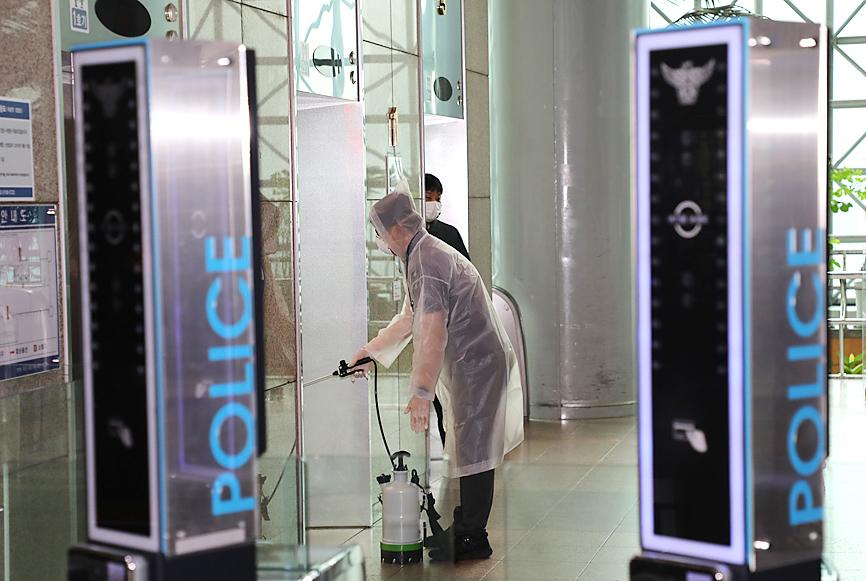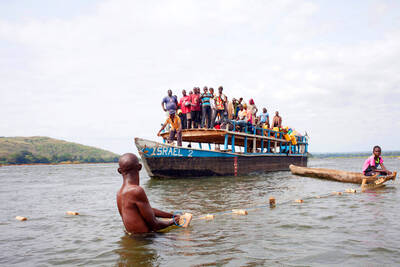South Korea yesterday added its most new COVID-19 cases in months, driven by a surge around the capital that appears to be spreading nationwide.
The 324 new infections was its highest single-day total since early March and the eighth consecutive triple-digit daily increase.
Most of the people infected live in the densely populated Seoul metropolitan region, where health workers are scrambling to track transmissions from various sources, including churches, restaurants, schools and workers.

Photo: EPA-EFE
The new infections reported yesterday were from practically all of South Korea’s major cities, including Busan, Gwangju, Daejeon, Sejong and Daegu, the southeastern city that was at the center of a massive outbreak in late February and March.
The newest figures reported by the Korea Centers for Disease Control and Prevention (KCDC) brought the nation’s caseload to 16,670, including 309 deaths.
Health authorities had managed to contain the virus in the Daegu region by April, ramping up tests and extensively using cellphone location data, credit-card records and security camera footage to trace and isolate contacts, which allowed the country to weather the outbreak without placing meaningful restrictions on its economy.
Another factor was that the narrowness of the Daegu outbreak effectively aided its containment — most were tied to a single church congregation of thousands of members.
It is unclear whether South Korea’s previous formula of success would be as effective since the Seoul region has many more people and new clusters are occurring in varied places as people increasingly venture out in public.
Churches had been a major course of new cases in the Seoul area before authorities shut them this week while raising social distancing restrictions, something they had resisted for months out of economic concerns. Nightclubs, karaoke bars, buffet restaurants and computer gaming cafes are also closed while spectators have been prohibited again from baseball and soccer games.
KCDC Director Jeong Eun-kyeong said the government should consider stronger distancing measures — possibly including banning gatherings of more than 10 people, shutting schools, halting professional sports and advising companies to have employees work from home — if the virus’ spread does not slow after the weekend.
Jeong said the country is now conducting 50,000 tests per day, compared with about 20,000 per day during the Daegu outbreak, while fighting what she described as the country’s biggest crisis since the emergence of COVID-19.
She said that 732 infections confirmed as of yesterday were linked to members of a northern Seoul church led by a vocal critic of the country’s president.
Sarang Jeil Church pastor Jun Kwang-hun was on Monday hospitalized with COVID-19 after participating in an anti-government protest last week where he shared a microphone on stage with other activists.
Health workers have used location data from cellphone carriers to identify about 15,000 people who spent more than 30 minutes on the streets where the protests took place and are alerting them to get tested.
At least 71 infections have been linked to the protests.
In other developments in the Asia-Pacific region, India’s COVID-19 caseload crossed 2.9 million with a surge of 68,898 in the past 24 hours.
The Indian Ministry of Health and Family Welfare yesterday also reported 983 more deaths, taking total fatalities to 54,849.
India has been recording at least 50,000 new infections per day since mid-July.
Australia’s hard-hit Victoria state yesterday reported its lowest tally of new COVID-19 cases in more than six weeks.
Victoria’s Department of Health and Human Services reported 179 new infections and nine deaths in the latest 24-hour period, the lowest daily increase since July 8.

‘IN A DIFFERENT PLACE’: The envoy first visited Shanghai, where he attended a Chinese basketball playoff match, and is to meet top officials in Beijing tomorrow US Secretary of State Antony Blinken yesterday arrived in China on his second visit in a year as the US ramps up pressure on its rival over its support for Russia while also seeking to manage tensions with Beijing. The US diplomat tomorrow is to meet China’s top brass in Beijing, where he is also expected to plead for restraint as Taiwan inaugurates president-elect William Lai (賴清德), and to raise US concerns on Chinese trade practices. However, Blinken is also seeking to stabilize ties, with tensions between the world’s two largest economies easing since his previous visit in June last year. At the

UNSETTLING IMAGES: The scene took place in front of TV crews covering the Trump trial, with a CNN anchor calling it an ‘emotional and unbelievably disturbing moment’ A man who doused himself in an accelerant and set himself on fire outside the courthouse where former US president Donald Trump is on trial has died, police said yesterday. The New York City Police Department (NYPD) said the man was declared dead by staff at an area hospital. The man was in Collect Pond Park at about 1:30pm on Friday when he took out pamphlets espousing conspiracy theories, tossed them around, then doused himself in an accelerant and set himself on fire, officials and witnesses said. A large number of police officers were nearby when it happened. Some officers and bystanders rushed

Beijing is continuing to commit genocide and crimes against humanity against Uyghurs and other Muslim minorities in its western Xinjiang province, U.S. Secretary of State Antony Blinken said in a report published on Monday, ahead of his planned visit to China this week. The State Department’s annual human rights report, which documents abuses recorded all over the world during the previous calendar year, repeated language from previous years on the treatment of Muslims in Xinjiang, but the publication raises the issue ahead of delicate talks, including on the war in Ukraine and global trade, between the top U.S. diplomat and Chinese

RIVER TRAGEDY: Local fishers and residents helped rescue people after the vessel capsized, while motorbike taxis evacuated some of the injured At least 58 people going to a funeral died after their overloaded river boat capsized in the Central African Republic’s (CAR) capital, Bangui, the head of civil protection said on Saturday. “We were able to extract 58 lifeless bodies,” Thomas Djimasse told Radio Guira. “We don’t know the total number of people who are underwater. According to witnesses and videos on social media, the wooden boat was carrying more than 300 people — some standing and others perched on wooden structures — when it sank on the Mpoko River on Friday. The vessel was heading to the funeral of a village chief in